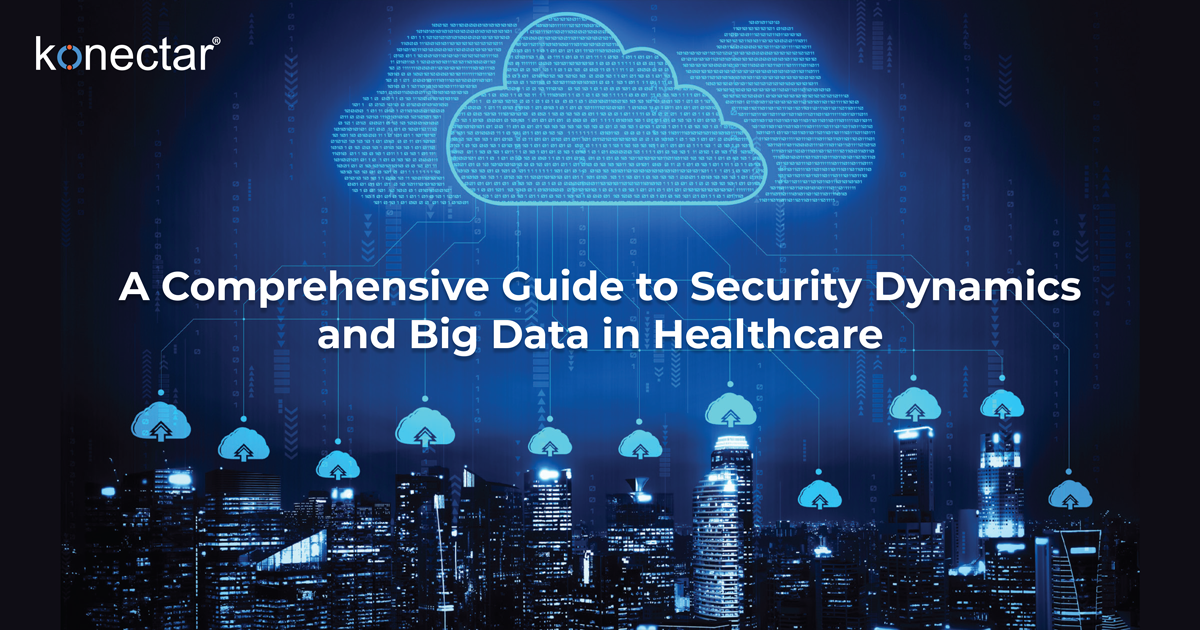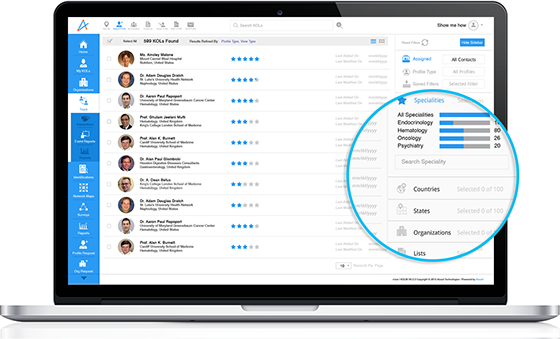24 Jan 2024
A Comprehensive Guide to Security Dynamics and Big data in Healthcare

In this article:
The healthcare industry has to deal with numerous challenges in managing patient information across diverse databases. However, the growth of data at an unprecedented pace renders conventional data mining techniques obsolete. This is mainly due to limitations in storage capacity and processing speed. The emergence of big data in healthcare can be deemed as a pivotal solution, which can efficiently store vast amounts of patient data through various intelligent storage mechanisms.
The Intersection of Big Data and Healthcare Security
The advanced data analytics and robust security measures converge to address the unique challenges and opportunities within the healthcare industry. As healthcare organizations increasingly digitize patient records and adopt electronic health systems, the volume and complexity of data generated is rising continuously. This necessitates sophisticated approaches to safeguard sensitive information.
One of the primary applications of big data in healthcare security is in threat detection and prevention. The vast amounts of data generated by healthcare systems, including patient records, diagnostic information, and treatment plans, can be analyzed in real-time using data analytics. This enables the identification of unusual patterns or anomalies that may indicate potential security breaches or unauthorized access to patient information.
Moreover, it enhances the implementation of behavioral analytics in healthcare security. By establishing baselines of normal user behavior, deviations from these patterns can be swiftly identified. This proactive approach allows healthcare organizations to detect and respond to potential insider threats or external cyberattacks more effectively.
The integration of big data with healthcare security also plays a crucial role in ensuring compliance with stringent regulations such as audit trails. Such technologies facilitate comprehensive data audits, tracking every access and modification to patient records.
Furthermore, the scalability and flexibility offered by big data technologies are particularly advantageous in the healthcare sector. As the volume of healthcare data continues to grow, big data solutions enable healthcare organizations to scale their security infrastructure accordingly. This allows them to protect patient information without compromising on performance.
Challenges Faced by the Healthcare Industry in Maintaining Data
The healthcare sector deals with various data security related issues and threats. Recognizing these challenges is crucial to understanding the role of big data in improving healthcare security. Below are some of the challenges faced by the healthcare sector when securing the data
-
Cyber security threats
The risk of exposing sensitive information in healthcare data breaches, such as social security numbers and medical records, can lead to identity theft and financial fraud, causing financial losses and harm to the reputation of medical facilities. In a study on data breaches, it was reported that of all the industries, the healthcare sector was the most significantly impacted. It surpassed the combined figures for finance, education, retail, and government sectors by more than threefold. Additionally, there is a noticeable upward trajectory in the number of records compromised each year.
Notably, malware and ransomware attacks are prevalent due to the abundance of sensitive patient data. The Hollywood Presbyterian Medical Center's 2016 ransomware incident exemplifies the potential disruption, including compromised patient data and financial losses.
Phishing attacks can lead to severe consequences. Insider threats, whether intentional or unintentional, pose significant cybersecurity challenges. DDoS (Distributed Denial-of-Service) attacks disrupt network functioning, and cloud threats compromise medical records and personal data. These diverse threats underscore the need for robust cybersecurity in healthcare.
-
Regulatory compliance
Navigating the complexities of regulatory compliance remains a continuous task for healthcare organizations. Healthcare providers must develop comprehensive incident response plans, conduct timely investigations, and notify relevant parties within regulatory timelines. Additionally, managing third-party vendors introduces challenges which require stringent supervision to ensure that these external entities align with regulatory standards in handling healthcare data.
The use of mobile devices in healthcare introduces another layer of compliance challenges. Healthcare organizations (HCOs) are required to secure patient data accessed or stored on mobile devices, enforcing policies and implementing secure mobile applications. Ongoing staff training and awareness programs are vital to maintaining compliance. Lastly, ensuring the integrity of audit trails remains a priority, with healthcare organizations mandated to secure and make accessible logs for auditing purposes while preventing tampering.
-
Legacy systems
A significant challenge plaguing the healthcare sector is its heavy dependence on outdated legacy systems. Numerous clinical systems and medical devices within the industry are still powered by obsolete software stacks, making them incompatible with essential security updates.
Patient data, often stored in these less-secure environments, contains valuable personally identifying information, including date of birth and addresses. This makes such data a lucrative asset for criminals engaged in identity theft and credit card fraud. The inherent vulnerability of these systems compromises the ability to implement critical patches and updates, leaving them exposed to potential cybersecurity threats.
-
Data interoperability
The healthcare industry encounters substantial challenges in maintaining data interoperability, hindering the seamless exchange of information crucial for comprehensive Patient Care. Another significant challenge arises from the presence of disparate electronic health record (EHR) systems.
Varied EHR systems with differing capabilities and functionalities impede the interoperable sharing of patient data among healthcare providers. The lack of a standardized approach to EHR systems limits collaborative and coordinated care, impacting the overall quality of healthcare delivery. Balancing the imperative of data accessibility with robust privacy measures remains an ongoing challenge.
-
Patient privacy concerns
Ensuring patient privacy is a formidable challenge in the maintenance of Healthcare Data. The digitization of health records and the prevalence of electronic health systems intensify concerns about unauthorized access and breaches that could compromise the confidentiality of patient information.
Managing and accessing the patient data while upholding the stringent privacy standards becomes an ongoing struggle for healthcare professionals. This will require continuous improvements in cybersecurity and robust access controls.
How does Big Data Analytics in Healthcare help in Fraud Prevention?
Big data analytics can identify anomalies and irregular patterns in vast datasets. By establishing a baseline of normal behavior, any deviations or suspicious activities can be flagged for further investigation. This proactive approach helps in detecting potential cyber fraud before it escalates.
Efficient big-data solutions are crucial to prevent healthcare fraud and waste. The complexity of medical billing and the variety of available products make it prone to errors. Patients often overlook mistakes in electronic medical records and insurance documents. Fraud, waste, and abuse (FWA) include both unintentional errors and deliberate billing discrepancies, imposing significant costs on insurers.
Healthcare fraud, scams, and misallocation of resources are challenges that most life sciences organizations have to face. Big data analytics emerges as a powerful tool to address these issues, identifying abnormal patterns like phantom billing and helping insurers recover losses. It also detects errors, reduces overcharging, and enhances CMS efficiency.
Various fraudulent activities, including bill inflation and subtle overcharging, extend to manipulating diagnoses for government disability payments. This technology draws from diverse sources, enabling insurance companies to analyze and compare providers and populations for fraud detection. Automated tools streamline this process, proactively addressing fraudulent practices in healthcare.
FAQs
-
What are the big data use cases in healthcare?
Big data finds its application in predictive analytics for identifying disease trends, improving clinical research and drug development, and enhancing operational efficiency through resource optimization.
-
Name some of the benefits of big data in healthcare?
It brings benefits such as improved diagnostic accuracy, personalized treatment plans based on patient data, and streamlined healthcare processes, leading to better patient care outcomes
-
How is big data used in healthcare?
In healthcare, big data is utilized to analyze extensive datasets, uncover patterns, and generate insights for informed decision-making. It plays a crucial role in predictive modeling, optimizing treatment strategies, and overall process improvement in the healthcare industry.
Conclusion
The ongoing innovations driven by big data will help the healthcare industry become more efficient, overcome challenges, creating a healthcare landscape that is not only more efficient but also prioritizes patient data security.
If you are a life sciences company or a consultant looking to gain in-depth insights into different aspects of HCP landscape, tune into our AI-Powered HCP Management platform konectar. For more information, request a Demo!






